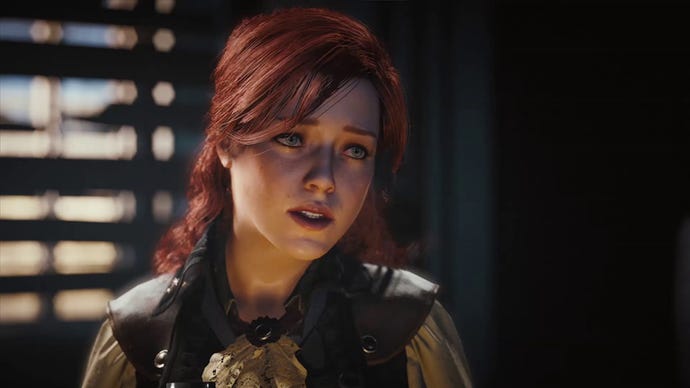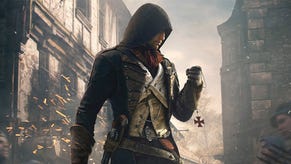Petition to rename Unity "Assassin's Creed: Elise"
Elise is the best thing to happen to the Assassin's Creed franchise since the ability to punch minstrels. Spoilers for the main storyline and ending ahead.
Assassin's Creed: Unity doesn't have any playable female characters, despite having multiple animated female NPCs including one with a bunch of combat moves, and I'm still annoyed by that. It doesn't seem any more stupid to allow Helix agents (that's you!) to select a different character to play in co-op than it does to say that four Helix agents are exploring the same simulation even though it's vitally important that you do it.
But whatever! Ubisoft made its decision and we're stuck with it, although hopefully not for many more releases. What interests me today is Ubisoft's comment, at the time the no-playable-women news broke, that the story does contain strong female characters. There certainly are plenty of tertiary and minor female characters, in heroic and villainous roles, including one of four members of the Assassin's council, for example.
I've already written about how I think the story-telling in Unity is some of the best the franchise has ever fronted, and part of the reason for that is that along with Arno, the protagonist, there are only three characters of real importance to the plot that you need to keep track of. These are the final villain (a man); Bellec, Arno's mentor (a man); and Elise de Salle, a woman, whom it's tempting to describe as Arno's love interest but who actually has a much more interesting and important role in the story.
That's a 1:3 ratio of women to men in major character roles, and (depressingly) that's significantly better than average for video games, so well done Ubisoft. But it's the fact that I don't feel comfortable writing Elise off as a simple love interest that first motivated me to take a closer look at Elise, and I found that she subverts more tropes than she embodies.
In the course of this article I will be discussing Assassin's Creed: Unity's plot and ending in detail, which will involve plenty of SPOILERS, so do be a good human and wander off immediately if you're yet to finish the main story sequence. Hot tip: just get it over with, the side content will be waiting for you when you're done.
Who is Elise?
Elise is introduced to us not as a sexy redhead to lust after - although she is and no doubt many people do - but as a child. We meet both her and Arno as children, and there's none of that unpleasant Hollywood business of sugar-coating sexuality by putting little kids in romantic pairings. Arno is a bored boy waiting for his dad, and Elise is just another kid - someone his own age, full of mischief, who tempts him to disobey his father and have some fun.
The pair share a game and when it looks like they're going to get in trouble, Arno tries to offer himself to the guards in Elise's place. Of course, it turns out the guards have no interest in the kids' pranks, as Elise instantly realised, while Arno made a bit of an idiot of himself in front of her. This is a recurring theme: Arno has a hell of a protection complex, and Elise never needs his protection.
From the start we’re shown something of who Elise is. She’s never, ever presented as just a piece of eye candy. We know about her before we see that she is indeed an attractive young woman, and that she is special to Arno. We’re encouraged to value her and be interested in her before we know what she looks like and that she’s important to Arno.
Arno is fostered with Elise's family, and in early missions it becomes clear that the pair have become best friends - if not something more - and that they're both used to her father's disapproval or at least functional opposition to their relationship. Before we meet the adult Elise, we hear about her in conversations between Arno and de Salle senior, and we learn a bit more about her, or at least Arno's perception of Elise: she thinks parties and society stuff are nonsense, she has her own independent life distinct from Arno's, and she absolutely hasn't grown out of her mischievous ways.
When the pair reunite onscreen they share a passionate kiss (or, if you're unlucky, something far more disturbing). It's obvious their relationship is kept secret, and that Elise kind of relishes this; it seems Arno's perception of her as mischief-loving is correct. We also see that Elise keeps a lot of secrets from Arno, and that Arno isn't particularly distressed by it. It's just an aspect of their friendship and relationship that she has her own life.
So Elise is Arno's love interest, obviously, but they're already an established thing. He's not chasing after her. She's not held up as some sort of prize he and the player will get if they fight long enough. That's unusual, and what's even more unusual is that having established that she is special, Ubisoft didn't instantly refrigerate Elise, the usual fate of established female lovers at the start of action stories about men.
Right from the start we're shown something of who Elise is. We soon learn a lot more, but she's never, ever presented as just a contextless, one-dimensional piece of eye candy or an accessory to Arno. We know about her before we see that she is indeed an attractive young woman. We're encouraged to value her and be interested in her before we know what she looks like and that she's important to Arno.
Already Elise is a very rare thing: a female character who stands on her own merits, not just her relationship to male characters, and doesn't exist just to motivate a male character because he wants to win her heart or avenge her death.
And then: it gets better.
Elise is a Templar, and Arno's equal
It turns out Elise is an absolute arse-kicker. She can easily fight as well as any non-assassin NPC in the game, and depending on your skills and your gear, maybe even better than you. She's not an assassin, so you won't see her using a hidden blade or any of Arno's little gadgets, but she can run and climb and jump with the best of them, and takes an active part in all their investigations. She's genuinely one half of a partnership, not a foil to Arno's activities.
I want to be careful here, because female characters don't have to be doing the same things as the male ones in order to be good. Ubisoft has already been pretty good about giving female characters in Assassin's Creed a great deal of independence and power, for which it deserves applause. I certainly don't think we should discount other female characters, in Assassin's Creed and elsewhere, as "weak" female characters for that reason, because they don't use swords and climb rooftops. Elise, as a sword-wielding bundle of focused determination, is not necessarily a "better" female character than one who pursues more traditionally feminine habits.
But: when our predominantly male-dominated video games culture writes male characters, it usually writes them as people. When it write female characters, it usually writes them as stereotypes. Elise is not written as a stereotype first.
This is what we're trying to change, right? We're trying for female characters that are people first, and gender second. So that's why I think having female characters who do all the things male characters do and could even in some ways be considered pallet swaps for male characters is a pretty decent stepping stone on the way to really nuanced characters who reflect all the complex and beautiful facets that make up real world gender identity.
There aren't many female character you could swap out with a dude and have nothing change; their presentation within the text would seem really odd. To me, Elise could be replaced with a dude and nothing would have to change. She already has all the attributes almost always assigned to male characters - power, skill, agency, her own goals and aspirations, a life independent of the protagonist - but denied to female characters. That is unusual enough to make her worth celebrating.
And you know what? I'm not even done with this.
Teaching Arno a valuable lesson
Remember how I mentioned that Arno has a protection complex and it's a recurring theme?
In a lot of media, otherwise perfectly capable female characters suddenly go to pieces whenever it's convenient to have the male save her from something, either to glorify him or push her into his arms; they might start off strong, but once lip service has been paid, they go straight back to waiting in towers to be rescued. In Assassin's Creed: Unity, this trope is either very carefully implemented or deliberately subverted, which is awesome.
Here are a few examples: in one mission, you're pinned down in a building by snipers. Arno has a loaded gun, a phantom blade, berserk blades and, if all else fails, the hidden blade. Elise has a sword. She tells Arno - commands him, really! - to take out the snipers. It makes sense, because he's got the skills and tools for this precise situation, and she doesn't. It doesn't detract from the fact that a few rooms back she held off a bunch of melee guys (she does use guns occasionally, by the way). It doesn't make her helpless.
Later, you'll work together to take down guards on a crowded street. Elise suggests you split up; Arno goes up on the roof to take care of snipers while Elise fights a knot of melee attackers. Technically, you're "protecting" her here, but actually, Elise made a very good tactical decision to protect you both by dispatching enemies in the most efficient way. Unless you really mess up - and I mean like, wander away from the mission zone, or refuse to leave her to do as you're told - there's no way she'll die. Her health bar may as well not be on the screen. She holds off those baddies like a boss.
So even when Arno does protect Elise, it's in such a way that it doesn't rob her of of agency. Where it gets really interesting though is when the damsel in distress trope is leveraged for the story itself. There's a mission later on where Arno and Elise have finally worked out who the big baddie is and tracked him down - working together all the way, might I add, each contributing information and effort. They have exactly one shot at this guy, and taking him down is the burning passion of Elise's life (and Arno is not, you'll notice).
Arno f**ks it up. Elise tells him to take down the baddie while she holds off pursuers, because again Arno has the skills and tools to catch him when he legs it, whereas she doesn't. Instead of doing as she says, Arno sticks around, beating up the baddies he and we all know she could probably handle alone. In fact, by forcing Elise to do make her own hopeless attempt at the chase and thereby drawing more attention to herself, Arno actually puts her in far more danger than she would have been if he'd just done what she asked.
The baddie gets away, and Elise loses her s**t spectacularly, saying if Arno is not committed to her cause and is only going to get in the way then he can p**s right off. Most tellingly, she resoundingly call him out for trying to "save" her - and you can hear her quotation marks slamming into place. I think it's here that she says something like "When do I ever need saving?" I think I love her, I really do, because she genuinely never needs saving.
You can see why Elise is frustrated. Most of the time Arno trusts her command implicitly; in combat, they're a well-oiled machine, and their investigations work brilliantly. They're a great pair. But then, in this one pursuit of her life that she values more than anything, he puts his own priorities ahead of hers - and it's a priority that devalues her as a person. She is not a damsel in distress, and when he treats her like one, he ruins everything and shows he doesn't care about her goals.
The sting in the tail
Later the pair of them team up again; in fact, it's Elise's demonstration of how much she values him, and her opinion that he could do better, that brings him out of a massively emo slump when his whole life falls apart. Eventually they go after the big baddie once more, and this time you get a boss fight.
Arno, who has had some experience facing the boss's supernatural powers, takes the action lead while Elise provides a valuable distraction. Working together, the two of them seriously wound the villain - but Arno is trapped under a piece of fallen stonework. He begs Elise to help him out and to wait for him, but instead she leaves him there, goes after the baddie, and is killed, although she does bring the boss down with her.
When I first saw this, I put my control pad down in disgust. So they killed her after all, I thought, And now, what? Are we supposed to be like, she made a mistake and Arno was right all along, because she did need saving?
When Elise refuses to “save” Arno and goes after the boss, she’s showing commitment to the ideals she’s voiced throughout the game. She knows Arno can take care of himself; he doesn’t need “saving”. She may have one chance to take down the boss, and she takes it, because that’s what she’s there to do.
But then I realised I was caught in a trap of my own making. I was thinking so much about Elise as a woman, and as a woman surrounded by a world of stereotypes and tropes, that I'd forgotten to think of her as a person with her own agenda.
When Elise refuses to "save" Arno and goes after the boss, she's showing commitment to the ideals she's voiced throughout the game. She knows Arno can take care of himself; he doesn't need "saving" (as you see moments later when he frees himself), just as she never did. She may only have one chance to take down the boss, and she takes it, because that's what she's there to do.
It's entirely possible that if Elise hadn't done what she did the boss would have escaped, but after she batters him down and causes the explosion that kills her, the villain lies groaning on the floor barely able to move. All the player has to do is press the assassinate button.
(As an aside, the scene when Arno very slowly presses the hidden blade up into the villain's brain, complete with sound effects and Ubisoft's incredible facial animations, is one of the most intellectually gruesome moments I have ever experienced in a video game, and far more emotive than a blow struck in wild anger and shouting would have been.)
So Elise died exactly as she lived. She didn't prove Arno right; she proved herself right. And if she had been a male character, I wouldn't have been distracted from that message for one moment, which is precisely why I wrote this piece: to point out that there's a lot more going on in Elise's story arc than the inevitable death of a "minority" character. It's a valuable lesson for Arno, and for us, that we shouldn't reduce human beings down to our relationships to them, devaluing their agency and disrespecting their goals and motivations. The subtlety of this is going to go over a lot of heads, I think.
If you return to Arno's room above the Cafe Theatre after the credits roll, you can read Elise's final letter to Arno. "If you are reading this," she writes in classic style, going on to reiterate her commitment to her actions, and to urge Arno - and through him, the player - to respect her choices, and telling him one last time that she never needed, or wanted, to be saved.
Bloody hell, Ubi. Give your creative team a bonus and stand your market research legion down: that's how you write a game.













